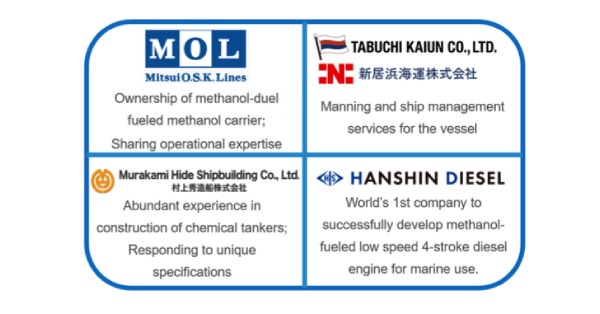~ Selected for METI and MLIT Subsidy for ‘Project on Transport Efficiency improvement Utilizing AI/IoT (Demonstration Project on Domestic Ship Innovative Operation Efficiency)~
Mitsui O.S.K. Lines, Ltd., MOL Coastal Shipping, Ltd., Tabuchi Kaiun Co., Ltd., Niihama Kaiun Co., Ltd., Murakami Hide Shipbuilding Co., Ltd., and The Hanshin Diesel Works, Ltd. have agreed to form strategic alliance aimed at reducing environmental impact through the development of methanol-fueled Domestic tanker.
The vessel development project, which targets delivery of the ship in 2024, was also selected to receive public funding through the Japanese Ministry of Economy, Trade and Industry (METI) and Ministry of Land, Infrastructure, Transport and Tourism (MLIT), “Subsidy for ‘Project on Transport Efficiency improvement Utilizing using AI/IoT (Demonstration Project on Domestic Ship Innovative Operation Efficiency)” (Note 1).
Methanol can reduce emissions of sulfur oxide (SOx) by up to 99%, particulate matter (PM) by up to using conventional fuel oil, which is currently the main fuel for marine vessels. Methanol has outstanding properties for use as a fuel, as it is liquid at normal temperatures and normal air pressure. Methanol fuel has been more widely introduced on ocean-going vessels as an environmentally friendly fuel, including four MOL Group-operated ships, but this will be the first methanol-fueled Domestic ship.
In addition, methanol can be produced with CO2 and hydrogen as raw material, so in the future, it can be produced by utilizing the CO2 capture and transport business to synthesize hydrogen, which uses electricity derived from renewable resources such as offshore wind power and wave power. If this methanol can be used as fuel, it can establish an environmental circulation type business model, enabling a reduction in net CO2 emissions.
The six alliance partners will each orchestrate their advantages in technology, expertise, and networks (Note 2) aiming to realize a decarbonized society.









































